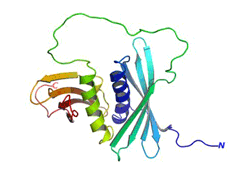
| Serial No. | GA-P0005HU |
| Species | Human |
| Specification | 0.1 mg/0.2mg |
| Brand | GenAsia |
| Origin | Shanghai |
| Price | US$350/US$620 |
Detailed information
1 Host: Escherichia coli (E. coli)
2 Species: Human
3 Protein Type: Recombinant
4 Synonyms: EDF, FRP, actba, inhba, inhbaa-001, edf, frp
5 Purity: 95% by SDS-PAGE
6 Application: WB、 Elisa、 Functional Studies
7 Background:
Activins are homodimers or heterodimers of the various beta subunit isoforms, belonging to the TGF-beta family. Mature Activin A has two 116 amino acids residues betaA subunits (betaA-betaA). Activin exhibits a wide range of biological activities, including mesoderm induction, neural cell differentiation, bone remodelling, haematopoiesis, and reproductive physiology. Activins plays a key role in the production and regulation of hormones such as FSH, LH, GnRH and ACTH. Cells known to express Activin A include fibroblasts, endothelial cells, hepatocytes, vascular smooth muscle cells, macrophages, keratinocytes, osteoclasts, bone marrow monocytes, prostatic epithelium, neurons, chondrocytes, osteoblasts, Leydig cells, Sertoli cells, and ovarian granulosa cells. As with other members of the super-family, Activins interact with two types of cell surface trans-membrane receptors (Types I and II) which have intrinsic serine/threonine kinase activities in their cytoplasmic domains, Activin type 1 receptors, ACVR1, ACVR1B, ACVR1C and Activin type 2 receptors, ACVR2A, ACVR2B. The biological activity of Activin A can be neutralized by inhibins and by the diffusible TGF-B antagonist, Follistatin.
8 Storage&Stability:
Avoid repeated freeze and thaw cycle.Store at 2-8℃ for delivery and store at -20 or -70℃ for future use. The loss rate of the target protein which describes the stability was determined by accelerated thermal degradation test.That is to incubate the protein at 37℃ for 48h and no obvious degradation and precipitation were observed.The loss of this protein is less than 5% within the expiration date under appropriate storage condition.
2 Species: Human
3 Protein Type: Recombinant
4 Synonyms: EDF, FRP, actba, inhba, inhbaa-001, edf, frp
5 Purity: 95% by SDS-PAGE
6 Application: WB、 Elisa、 Functional Studies
7 Background:
Activins are homodimers or heterodimers of the various beta subunit isoforms, belonging to the TGF-beta family. Mature Activin A has two 116 amino acids residues betaA subunits (betaA-betaA). Activin exhibits a wide range of biological activities, including mesoderm induction, neural cell differentiation, bone remodelling, haematopoiesis, and reproductive physiology. Activins plays a key role in the production and regulation of hormones such as FSH, LH, GnRH and ACTH. Cells known to express Activin A include fibroblasts, endothelial cells, hepatocytes, vascular smooth muscle cells, macrophages, keratinocytes, osteoclasts, bone marrow monocytes, prostatic epithelium, neurons, chondrocytes, osteoblasts, Leydig cells, Sertoli cells, and ovarian granulosa cells. As with other members of the super-family, Activins interact with two types of cell surface trans-membrane receptors (Types I and II) which have intrinsic serine/threonine kinase activities in their cytoplasmic domains, Activin type 1 receptors, ACVR1, ACVR1B, ACVR1C and Activin type 2 receptors, ACVR2A, ACVR2B. The biological activity of Activin A can be neutralized by inhibins and by the diffusible TGF-B antagonist, Follistatin.
8 Storage&Stability:
Avoid repeated freeze and thaw cycle.Store at 2-8℃ for delivery and store at -20 or -70℃ for future use. The loss rate of the target protein which describes the stability was determined by accelerated thermal degradation test.That is to incubate the protein at 37℃ for 48h and no obvious degradation and precipitation were observed.The loss of this protein is less than 5% within the expiration date under appropriate storage condition.








